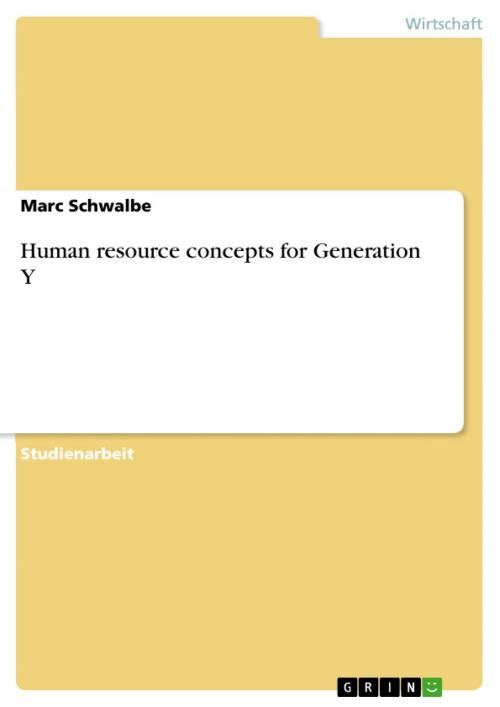| Author: | Marc Schwalbe | ISBN: | 9783656717027 |
| Publisher: | GRIN Verlag | Publication: | August 12, 2014 |
| Imprint: | GRIN Verlag | Language: | German |
| Author: | Marc Schwalbe |
| ISBN: | 9783656717027 |
| Publisher: | GRIN Verlag |
| Publication: | August 12, 2014 |
| Imprint: | GRIN Verlag |
| Language: | German |
Studienarbeit aus dem Jahr 2013 im Fachbereich BWL - Personal und Organisation, Note: 2,7, AKAD-Privathochschule Frankfurt, Sprache: Deutsch, Abstract: Generation Y (14 to 27 years old) is often tagged as a self-entitled group raised during prosperous economic times, placed on pedestals by their doting baby boomer parents. In the context of the workplace, they've been described as overly ambitious dreamers who don't want to pay their dues and are only concerned about higher pay and more time off. Generation Y (Gen Y) is also called 'Millennials'. The kinds of career and development opportunities Generation Y is asking for are going to require significant rethinking and retooling of how organizations are set up, how work is designed, and how people are managed and rewarded. Organizations need to act now. The largest generation since the baby-boomers, the Millennials are defined by their numbers. They will have a huge social and economic impact. There are three major characteristics of the Millennial group: 1) They are racially and ethnically diverse, 2) They are extremely independent because of divorce, day care, single parents, latchkey parenting, and the technological revolution that they are growing up alongside, and 3) They feel empowered; thanks to overindulgent parents, they have a sense of security and are optimistic about the future. The following assignment is going to examine the possibilities and concepts for the human resource management according to the generation Y.
Studienarbeit aus dem Jahr 2013 im Fachbereich BWL - Personal und Organisation, Note: 2,7, AKAD-Privathochschule Frankfurt, Sprache: Deutsch, Abstract: Generation Y (14 to 27 years old) is often tagged as a self-entitled group raised during prosperous economic times, placed on pedestals by their doting baby boomer parents. In the context of the workplace, they've been described as overly ambitious dreamers who don't want to pay their dues and are only concerned about higher pay and more time off. Generation Y (Gen Y) is also called 'Millennials'. The kinds of career and development opportunities Generation Y is asking for are going to require significant rethinking and retooling of how organizations are set up, how work is designed, and how people are managed and rewarded. Organizations need to act now. The largest generation since the baby-boomers, the Millennials are defined by their numbers. They will have a huge social and economic impact. There are three major characteristics of the Millennial group: 1) They are racially and ethnically diverse, 2) They are extremely independent because of divorce, day care, single parents, latchkey parenting, and the technological revolution that they are growing up alongside, and 3) They feel empowered; thanks to overindulgent parents, they have a sense of security and are optimistic about the future. The following assignment is going to examine the possibilities and concepts for the human resource management according to the generation Y.















